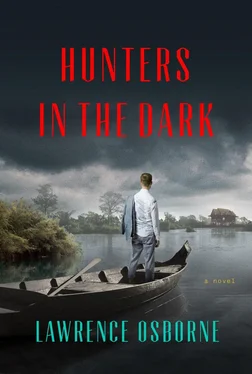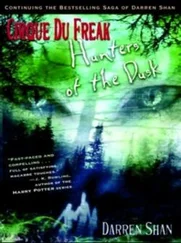That night she drove home to her flat in Marx Dormoy along empty streets and her gloom deepened. She wanted to be home. It was she who wrote to the Khmer embassy and told them about Chann. No one knew what to do with a perfectly preserved corpse — superstition had entered the equation. In bed, she told her French boyfriend about it and became slightly hysterical. But nerves never healed a situation. He told her, in his calm European way, that ghosts didn’t exist and she thought cruelly, The divide between us is enormous, isn’t it?
Later it seemed to her that this might have been the moment in which she decided to leave Europe, but in reality she had never been quite happy there. Easy to love Paris, yes, easy to love Sunday-morning walks on the Île de la Cité with her Frenchman and the pastries at Stohrer on the rue Montorgueil and a hundred other things great and small. But even with Claude she always felt alone. She was not really in love with him. Her favorite place in the city, after all, was the church of Saint Gervais and Protais, near the river, whose back door was always left open late at night. She would go there and sit alone in the pews and feel the musty medieval ghosts in that Gothic nave. She was sure she could have been a psychic if she had wanted to. An upper-middle-class Khmer girl with a little family money but no inner reason to be in that world apart from a medical education and a taste for escape. What she had escaped from was her own family. The gloom that surrounded them like an invisible miasma. They were people who frequently liked to quip, “It’s a miracle we’re alive!” But if it was a miracle, who could explain it, and why should other miracles not exist? “Do I believe in miracles?” she began to ask herself. “Me, a doctor in the making, a rational agent?” Could a body really remain perfectly preserved for years in a sealed room? Her father said yes. But it was a miracle anyway.
It was now her own life as a temporary emigrant that began to feel insubstantial. All along, it had been her father who drove her from behind, who constantly admonished her to succeed in Europe. She was doing it for him. Even listening to classical music — it was his urging, his idea. It was he who had driven her to be ambitious and study in Paris. In reality it had been his own dream and she was the one who now had to fulfill it. Not being her own dream, however, it sat uneasily with her. She was not, in fact, ferociously ambitious. She wanted to drift and roam and roll through childish adventures, not get up for 9 a.m. lectures and dissect cadavers in cold rooms. Yet she also thought having dreams, the very concept of having a dream, was childish and absurd. Why did one need to have illusions like that in order to just live? Living was not a project with a propaganda film driving it. It was pulled along by mystery and pleasure, not by a desire to have a big house in Neuilly by the time she was forty.
And increasingly, finally, the enchantment of Paris began to wear off. The sullen bitterness under the surface, the men pissing in the streets defiantly, the feel of quiet decay. It was a slow-motion decay which had gone hand in hand with a slightly hysterical campaign of urban renewal and antiseptic respectability. But the men were still pissing in the street and there was still a feeling of stasis and creeping old age. Europe dying on its feet of torpor and smugness and debt. Half the people her own age were unemployed, living in a state of dependency. At the hospital they were continually handing out free antidepressants to middle-class brats who didn’t want to pay for them. It would have been morally shocking in Phnom Penh, of course, and privately she was shocked. But her boyfriend scoffed at her. Why shouldn’t they have free Paxil for their imaginary mental disorders? “You’re all brainwashed to accept it,” she retorted. “You have no connection to real life. You’re on life support and you don’t even know it.” Work isn’t everything, he would sometimes say, thinking that she would agree with him, given her wonderfully lazy proclivities. And yet she knew it was false. Work indeed was everything and she began to wonder if she would ever have work that meant something to her. She didn’t want to be a doctor, however. Working full-time as a doctor in Paris had the vague feeling of living as a tourist in an expensive boutique now designed merely for other tourists. What her father didn’t understand because he lived mentally in another age was that now it was Europe that was adrift and listless. Her sense of moral superiority was also adrift — how often Sophal had to listen to overheated journalistic lectures about trafficking and servitude in her own country from these fleshy know-it-alls, who in reality knew nothing at all about anything. Thank God, she began to think severely, you’re here to save us. To make us more like you.
She returned to the bedroom and kissed Robert on his cheek and walked back out into the fresh, wet early morning and downstairs to the lobby, where the boys were all asleep like figures in a painting. The rain had finally stopped and she walked down to Norodom and went along the boulevard in the lonely coolness, glad to be alone again and wondering about what had happened. It didn’t occur to her to think about whether she had enjoyed it. Enjoyment was not the issue yet. There was something graver at stake. But this grave thing was — apart from being grave — distressingly unclear. It was about whether she had thrown herself into a well.
She found the first open café in a side street and sat at an outside table with a double espresso and a croissant and smoked her Wonders as the traffic began to thicken and a pale light spread across the facades of the travel agents and two-bit boutique hotels and chic bakeries. There must be a moment when happiness begins — an actual, precise moment — and she began to think that she was experiencing that moment now. She let the smoke calm her and still her shaking hands.
When they had calmed she remembered other moments like this in the past. When her French boyfriend had asked her to come with him to see his family in Avignon. But on that occasion she had refused. The prospective happiness had been too elaborate, too planned, and her prim refusal of it had made complete sense only hours afterward. One didn’t become happy so easily. She was convinced, perhaps childishly, that it had to be unexpected. That was the problem with her whole European phase: where was the unexpected?
Simon was the unexpected incarnate.
She walked home then and let herself in through the outer gate and went through the dripping garden as the maids were beating the carpets in the damp air. They looked up at her with amused complicity, those two old women who had known her since she was small. She went up to her room and fell onto her bed in her clothes and slept into the late afternoon, and when she woke the koel birds were announcing an early evening of mosquitoes and low sun and drinks with ice at the edge of growing shadows.
She went out that night to a party at the house of a French artist on a street not far from her own house. She walked there along Pasteur, past the upscale lounge-style restaurants and the Japanese bars. Like her father’s house, it was a massive old French villa which the owner had restored with his personal fortune. In his garden, the Frenchman had placed artworks by several well-known Khmer artists and surrounded them with an open bar lit with Vietnamese lanterns. Inside, the ground floor had been converted into the evening’s playground and there she whiled away a few hours drinking vodka cocktails and finding her friends. It was the sort of evening she was becoming used to during her time of “unemployment.” With no pressing financial worries, no rent to pay, she could do what she wanted with her evenings and she had consequently fallen into a lulling rhythm of long nights and late risings and mild hangovers. She knew it would pass eventually, but for the moment she felt it was exactly what a twenty-five-year-old should be doing with her life. There were no pleasant surprises, but no unpleasant surprises either. She was now in her own culture and she could float or sink according to its own laws of gravity.
Читать дальше












